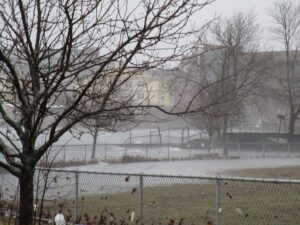Much of Salem’s uniqueness is due to its geography, and being a coastal community is something that needs to be respected and carefully managed. We see the climate crisis literally on our streets and at our doors when each major storm rolls through and the tides rise up.
I have been attending Salem’s SERC meetings (Salem’s Sustainability, Energy and Resiliency Committee ) to learn more about what initiatives are in play and what more can be done at the city level. Salem is leading in many areas, but to really make a positive net impact on the climate crisis, solutions need to be big and lasting.
Remember the huge hole in the Ozone layer? Don’t hear much about that these days do you. It is because back in the late 80s, political leaders at a global level were able to come together and agree on sweeping policy change and created the Montreal Protocol. All 197-members of the UN agreed to this pack (the only UN treaty ever to do so). And you know what? It was effective!
Without the pact, the U.S. would have seen an additional 280 million cases of skin cancer, 1.5 million skin cancer deaths, and 45 million cataracts—and the world would be at least 25 percent hotter.
(For those that did not grow up in the 80s like me, read more about the history here)
See that level of global partisanship happening these days? Unfortunately, neither do I, but there are still problems that need this level of action.

We see the true cost of fossil fuels right here in Salem. But if fossil fuels continue to be utilized without penalty & there is no incentive to stop, and we will continue racking up our unseen debt in the form of damage to our environment.
I want to thank my State Representative Paul Tucker for cosponsoring H2810, “An Act to Reduce Greenhouse Gas Emissions and Promote Green Infrastructure.”
An Act like this is big, bold action. Adding a fee to something that you want to reduce use on, is a proven effective method.
Rep Tuckers’ letter in the Salem News August 11th did an excellent job explaining how the fee is not designed to tax the average energy consumer;
Nobody wants to pay more for energy — and many people, especially low and middle income households, don’t have the ability to pay even a little bit more. That is why most of the revenues from the carbon fee go right back to consumers. On average, low and middle income households — and all households that conserve energy — will get rebates that are the same as, or slightly larger than, any increase in energy costs.
Paul Tucker, State Representative Salem
At first sight, I agree any new “fee” should be closely scrutinized, and I urge everyone to ‘crunch the numbers’ to understand the impact.
But the debt that we continue to collect, the sometimes unseen damage to the environment, is continuing to add up.
We need to continue with Salem’s resiliency efforts, and make bold moves at the city level as well; now is the time to enact effective solutions for a healthy and safer Salem.